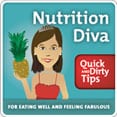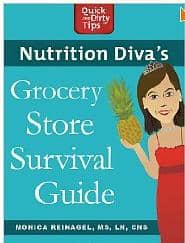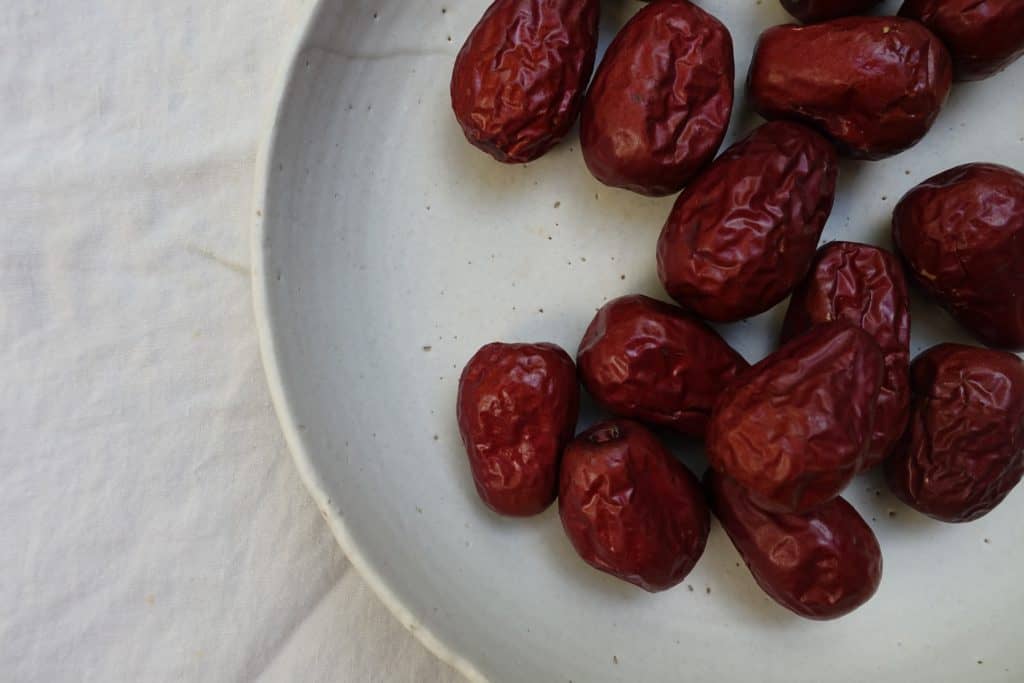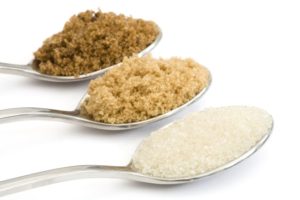 Today, one in every 5 kids is obese and a great many more are overweight. Not only is this a cruddy way to spend your childhood, but overweight kids are highly likely to become overweight adults, battling both their weight and the associated health problems for a lifetime. In this week’s podcast, I outline three simple things you can do to help your kids maintain a healthy weight. Read or listen to it here.
Today, one in every 5 kids is obese and a great many more are overweight. Not only is this a cruddy way to spend your childhood, but overweight kids are highly likely to become overweight adults, battling both their weight and the associated health problems for a lifetime. In this week’s podcast, I outline three simple things you can do to help your kids maintain a healthy weight. Read or listen to it here.
Tag: sugar
How Nutritious is 100% Fruit Juice? Not Very.
 Q. What should I look for when buying fruit juice? For example the “100% pure and natural orange juice” says it contains 0% Vitamin C. How is that possible? Another one provides 100% Vitamin C but from the list of ingredients we see that Vitamin C is actually added.
Q. What should I look for when buying fruit juice? For example the “100% pure and natural orange juice” says it contains 0% Vitamin C. How is that possible? Another one provides 100% Vitamin C but from the list of ingredients we see that Vitamin C is actually added.
A. The USDA considers a half cup of fruit juice equivalent to a serving of fruit but I have my doubts. Processed fruit juice–even 100% juice–is a distant second to fresh whole fruit in terms of its nutritional value. For one thing, fruit juice is a very concentrated source of sugar and calories. All the fiber, which slows the absorption of the sugars in whole fruit, has been removed.
Secondly, many (most?) of the naturally-occurring nutrients are lost during processing, pasteurization, and storage. As you found, manufacturers may compensate for this by adding nutrients back to the juice after the fact. You could get the same benefit from taking a vitamin C capsule.
See also: Juicing for Health and Nutrition
Juice and Diabetes Risk
Nutritionally, I’d rank processed fruit juice only slightly higher than soda and other sweetened beverages. In fact, a large study conducted in China found that people who drink two or more servings of juice a week are 25% more likely to develop Type 2 diabetes compared to those who rarely drink juice. This is consistent with another large 2008 study, which also found that increased juice consumption led to an increased risk of Type 2 diabetes–but that eating more whole fruit decreased diabetes risk.
My Advice?
Eat Fruit; Drink Water. (Same for your kids!)
_____________
My newest book, Secrets for a Healthy Diet: What to Eat, What to Avoid, and What to Stop Worrying About is my essential guide to all the food choices you make every day. Read a sample chapter here.
Shop Smart: Finding the Healthiest Options
 Q. We just moved to Texas from Ireland. I am trying to find a bread in local markets that has no sugar and low salt. I am also trying to find canned/jars of plain crushed tomatoes with no salt as I make my own sauce. I am shocked at the amounts of salt and sugar in everything here in the USA.
Q. We just moved to Texas from Ireland. I am trying to find a bread in local markets that has no sugar and low salt. I am also trying to find canned/jars of plain crushed tomatoes with no salt as I make my own sauce. I am shocked at the amounts of salt and sugar in everything here in the USA.
A. When you eat foods that are high in salt and/or sugar, you get accustomed to a greater degree of saltiness and sweetness. I guess the selection of processed foods you’re finding in American grocery stores shows what we’ve become accustomed to. (The good news? It works both ways: You can retrain your tastebuds to prefer less salt and sugar by gradually decreasing the amounts.)
See also: The Great Salt Debate
It should be possible to find some brands that are lower in salt and sugar, though, even in a mainstream grocery store. Ezekiel, Pepperidge Farm, and Nature’s Own all make breads that are relatively low in salt and sugar, for example. Hunt’s and DelMonte both produce canned tomatoes with no salt.
To make the hunt for healthier options a little easier, check out the following tools: Continue reading “Shop Smart: Finding the Healthiest Options”
The Antidote to Fructose Fears
 For as long as Gary Taubes and Robert Lustig have been sounding the alarm about sugar (in general) and fructose (in particular) being the fall of Western civilization, I have been attempting to inject some much-needed perspective into the discussion. (See the bottom of the post for links to my articles dating back to 2007).
For as long as Gary Taubes and Robert Lustig have been sounding the alarm about sugar (in general) and fructose (in particular) being the fall of Western civilization, I have been attempting to inject some much-needed perspective into the discussion. (See the bottom of the post for links to my articles dating back to 2007).
In my opinion, the black-and-white view promoted by Taubes and Lustig is counter-productive. Instead of helping people set reasonable limits on their sugar intake, they’ve got people afraid to have an apple for fear of the fructose it contains.
If you eat large quantities of sugar–say, 25% or more of your daily calories for an extended period of time–you may well experience the doomsday scenario that Taubes and Lustig depict–fatty liver, altered metabolism, increased appetite, diabetes, obesity, and reduced life expectancy. On the other hand, these effects have not been seen in people (or rats) who consume sugar in moderate quantities.
Sweetened with Dates: How Healthy Is It Really?

Q. I watch my sugar intake and I’ve been searching for a healthy granola bar. Finally, I found Larabars at my grocery store: Only three ingredients and no added sugar. Awesome! My only concern is that the sugar content, while derived completely from dates, is very high. If I’m limiting my added sugar intake, should I also pay attention to sugars from natural sources? Thank you for your advice!
A. You have to be impressed by a processed food with only three ingredients! But I’m glad you didn’t let the glare of that health halo blind you to the high sugar content.
In terms of “added sugars,” the Larabars squeak through on a technicality. Added sugars usually refers to refined sugar and other concentrated sweeteners like honey or maple syrup. (Yup, even though they’re natural, they’re considered added sugars!) The naturally-occurring sugars in whole fruit and dairy products are usually given an exemption.
By the usual definition, the dates in your granola bar wouldn’t be considered added sugar. But, frankly, dates are about as close as you can get to sugar and still call yourself a fruit. (For that matter, I guess sugar cane could technically be considered a whole grain!)
How Nutritious are Dates?
An ounce of medjool dates contains 19 grams of sugar and 2 grams of fiber. An ounce of honey provides 23 grams of sugar and 0 grams of fiber. Neither one is a significant source of vitamins or minerals. (Click the links to see the complete nutrition facts.)
Aside from a gram or two of fiber, a bar sweetened with dates is really not that much different from a bar sweetened with honey. Ask yourself this: If the bar were sweetened with honey instead of dates, would it be more sugar than you’d be willing to eat? Although I’m all for whole foods and short ingredient lists, I agree with you that a bar with less sugar might be a better choice.
See also:How much fruit is good for you?
Are Your Nutrition Priorities in the Right Order?
I’ve been giving a lot of interviews surrounding the launch of my book this month and reviewers seem fascinated by the subtitle: What to Eat, What to Avoid, and What to Stop Worrying About.
As I wrote in the introduction to the book, “that last category may be the most important of all…In addition to helping you make the best choices at the grocery store and navigate the many decisions you make throughout the day, my ultimate goal is to help you prioritize the things that will make the biggest difference in your health.”
I can’t think of a better illustration for this than the e-mail I received this morning: Continue reading “Are Your Nutrition Priorities in the Right Order?”
Sugar: The Bitter Half-Truth?
 Q. Are you familiar with Dr. Robert Lustig’s presentation on fructose, called “Sugar, The Bitter Truth” ?
Q. Are you familiar with Dr. Robert Lustig’s presentation on fructose, called “Sugar, The Bitter Truth” ?
What’s your opinion on this? Shouldn’t pure fructose sweeteners (which are marketed as low calorie) be banned? According to this presentation, wouldn’t it be a good idea to substitute all sucrose with a larger amount of maltose?
A. Although I respect Dr. Lustig and his work, your questions are the perfect illustration of just how badly this viral video has confused the issue among consumers (and more than a few professionals). Here’s what always seems to get lost in the biochemical mumbo-jumbo: Dr. Lustig’s observations apply to the dangers of excessive fructose intake.
Dessert Rules
 Q. I am a healthy, active person trying to maintain my weight. About once or twice a week I will have a nice dessert at my favorite bakery, staying within my allotted calories for the day. My question is: though I’m keeping calories down, is it still healthy?
Q. I am a healthy, active person trying to maintain my weight. About once or twice a week I will have a nice dessert at my favorite bakery, staying within my allotted calories for the day. My question is: though I’m keeping calories down, is it still healthy?
A. Well, sweets aren’t exactly health-promoting. Nonetheless, But I do believe that a healthy diet can include the occasional sweet treat. Here are my guidelines:
